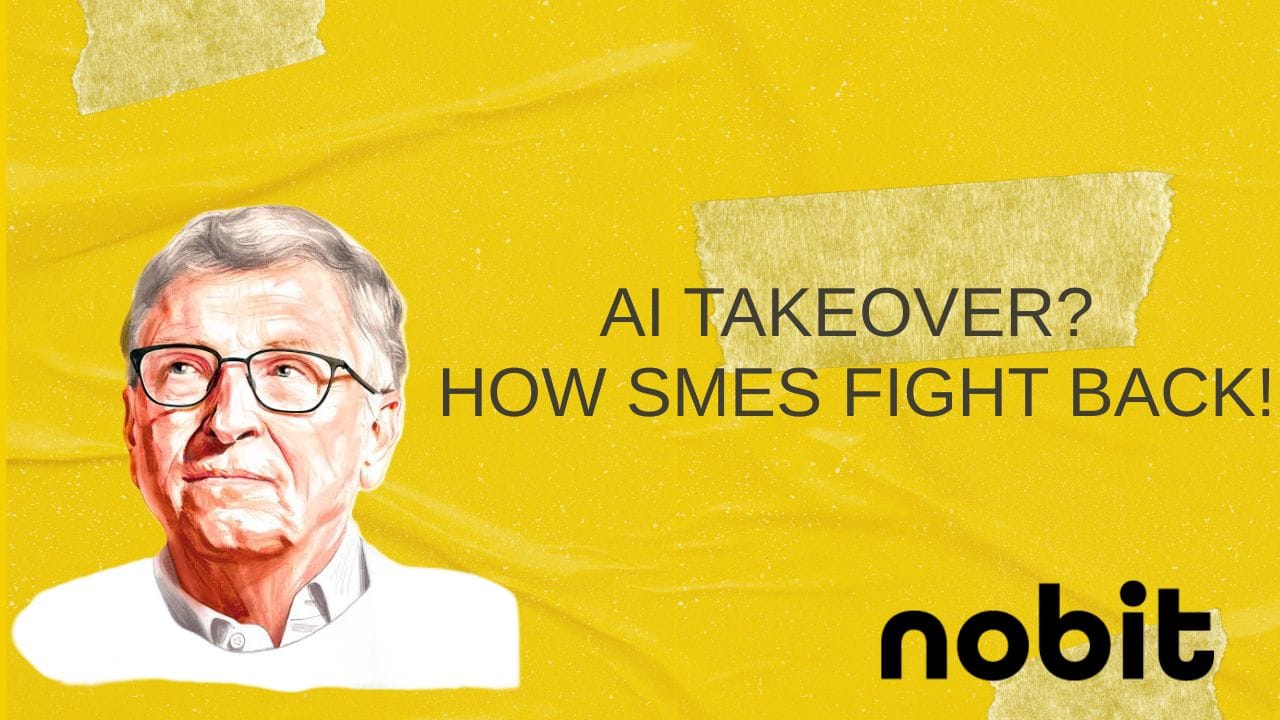
Bill Gates Says AI Can’t Beat Humans at THIS!
Bill Gates Says AI Can’t Beat Humans at THIS!
Microsoft co-founder Bill Gates predicts that within the next decade, AI technology will become ubiquitous, automating most routine tasks while leaving creativity, emotional intelligence, and strategic thinking as uniquely human strengths. For small and medium-sized enterprises (SMEs), this AI revolution presents both challenges and unprecedented opportunities for growth.
The AI Wave: Opportunities and Threats for SMEs
1. Cost Efficiency and Lower Barriers to Entry
AI tools enable SMEs to access advanced capabilities at a fraction of traditional costs:
- AI-powered customer service (e.g., ChatGPT chatbots) reduces staffing needs while providing 24/7 support.
- Automated accounting & financial analysis (e.g., QuickBooks AI, Xero) helps SMEs track cash flow in real time without hiring expensive accountants.
- AI-driven marketing tools (e.g., Canva AI, ChatGPT ad copywriting) allow small businesses to create professional-quality content without agencies.
Example: A small e-commerce store can use AI to analyze customer behavior and optimize ad targeting—no data science team required.
2. Rising Competition: Digital Transformation Becomes Essential
Larger corporations are rapidly adopting AI to optimize supply chains, production, and customer management. SMEs that lag behind risk falling behind:
- Manufacturing: AI-powered smart factories (automated QC, predictive maintenance) threaten traditional SMEs still reliant on manual processes.
- Retail: Giants like Amazon use AI for dynamic pricing and inventory management, forcing small retailers to adopt similar tech or lose competitiveness.
- Professional services: AI legal assistants, diagnostic tools, and consulting algorithms may replace entry-level services, pushing SMEs to focus on high-value advisory roles.
Solution: SMEs should adopt modular AI tools (cloud-based ERP, AI inventory systems) for affordable digital upgrades.
3. Creativity & Human Touch as Competitive Advantages
While AI can mimic creative tasks (e.g., generating logos or ad copy), it lacks true originality, emotional intelligence, and strategic judgment—areas where SMEs can excel:
- Personalized service: A boutique café might use AI for inventory but rely on baristas to craft bespoke drinks and build customer rapport.
- Artisanal & craft industries: AI can optimize production, but human artisans add unique value through craftsmanship and storytelling.
- B2B consulting: AI crunches data, but human experts provide strategic insights and decision-making.
Example: A small sake brewery in Japan uses AI to monitor fermentation but relies on master brewers to adjust flavors, blending tech with tradition.
Three Key Strategies for SMEs
1. Upskill Employees: From “Replaceable” to “AI Collaborators”
- Train staff on AI tools (data analysis, automation workflows).
- Equip managers with AI strategy skills to integrate tech into business models.
- Foster innovation (e.g., internal AI hackathons) to explore new applications.
2. Adopt AI Flexibly, Avoid Overinvestment
- Use subscription-based AI services (Microsoft 365 Copilot, Google AI tools) to minimize upfront costs.
- Prioritize high-ROI AI applications, such as:
- Sales forecasting (AI-driven market analysis)
- Customer segmentation (AI-enhanced CRM tagging)
- Production optimization (AI defect detection in manufacturing)
3. Enhance Customer Experience with Human-AI Balance
- AI for efficiency, humans for connection: e.g., restaurants use AI ordering but staff make personalized recommendations.
- Be transparent: Explain where AI is used (e.g., “Our designers use AI for drafts but refine details by hand”).
Future Challenges: Policy, Ethics, and Jobs
1. Preventing AI Monopolies
- If Big Tech controls key AI models, SMEs may face prohibitive licensing costs.
- Solution: Governments could subsidize open-source AI or offer tax incentives for SME adoption.
2. Job Market Evolution: From Displacement to New Roles
- Routine jobs (data entry, basic customer service) decline, but AI trainers, ethics auditors, and human-AI workflow managers emerge.
- SMEs can pivot into AI consulting, helping traditional businesses adopt automation.
3. Ethical AI: Transparency and Accountability
- Who’s liable if AI makes errors (e.g., biased hiring algorithms, financial misanalysis)?
- SMEs must establish AI governance policies to ensure compliance (e.g., GDPR) and ethical use.
Conclusion: AI as an Amplifier, Not a Replacement
As Gates notes, AI’s real power lies in augmenting human potential, not replacing it. To thrive, SMEs must:
✅ Leverage AI for efficiency without sacrificing their human touch.
✅ Differentiate through creativity in areas where AI falls short.
✅ Stay agile, adapting strategies as AI evolves.
The next decade will reward SMEs that strike the right balance between AI-powered efficiency and irreplaceable human value.
Reference :
CNBC News
Bill Gates Says AI Can’t Beat Humans at THIS!
